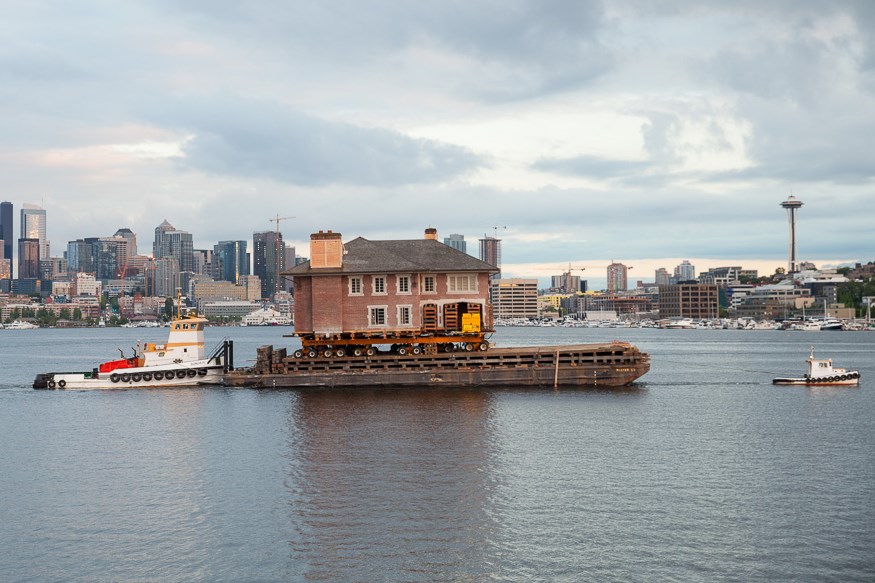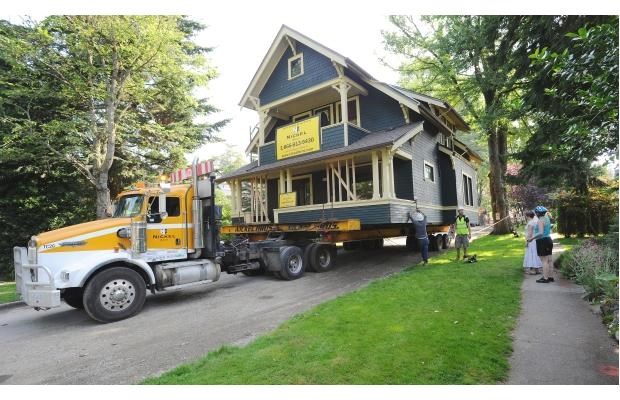Will Garry Point Park serve as the launching point for moving homes slated for demolition out of Richmond?
That’s what was suggested by Coun. Carol Day after she and Coun. Harold Steves questioned a city staff report that asserted relocating homes was infeasible due to modern energy efficiency guidelines.
On Monday, at a Richmond city council meeting, councillors unanimously approved a new bylaw aimed at curbing waste from home demolitions.
However, Day and Steves convinced council to also accept an additional resolution aimed at incentivizing — or at least promoting — moving homes out of the city to rural areas, instead of having them demolished.
Day said the city is “greenwashing” a problem with the proposed bylaw, as it stands, and relocating homes is “not an airy, fairy idea.”
James Connolly, marketing manager for Nickel Bros. House Moving Ltd., told council that relocating homes from Richmond to places such as the Fraser Valley, Gulf Islands or Sunshine Coast is feasible and a “green” option to the wrecking ball.
“It’s a city problem with a rural solution,” said Connolly.
Connolly said he has three house relocations planned in Richmond next month, with one house heading for the San Juan Islands in Washington State.

Connolly said a typical house could be moved and renovated for about $80,000, thus providing affordable home options for rural property owners and a clearer conscious for a city aiming to reduce its community carbon emissions.
Many of the houses have already been renovated; a house in Richmond with $80,000 worth of renovations recently sold for $72,000.
He called on Richmond to institute a differential permit system, whereby demolition fees cost thousands of dollars and relocation fees are minimal.
“You will see a world of difference in terms of the number of buildings being demolished,” said Connolly, adding the Town of Sidney has taken such measures.
Last year, Coun. Carol Day had suggested incentives for relocating homes.
However, a recent city staff report noted new energy efficient building codes “would likely serve to be cost prohibitive.”
The report also stated fees could not exceed the cost of providing a service, per provincial law. As well, recycling fees cannot be “punitive in nature in an effort to discourage demolition activities.”
However, Sidney instituted demolition fees of $2,500-5,000 and relocation fees of just $250. Since then the demolition fees have been lowered to $1,000.
Connolly said he didn’t know why the fees were recently reduced but his company nevertheless still sees a 50 per cent uptick in business there.
Connolly said moving houses (at night) in Richmond is easy because it’s accessible by water, flat and has fewer trees.
Day said Garry Point Park and the south dyke are good launching points for the houses.
Connolly said planning is needed amongst the development community to encourage more home relocations. He said if developers know their options well in advance, with the help of the city, companies like his can better accommodate the demand.
Connolly said Nickel Bros. prefers to move in bulk, meaning about three or four houses per barge.
Connolly noted the bylaw is limited without accounting for home relocation incentives.
“Whereas this bylaw that is being initiated in terms of demolition waste is well advised and certainly moving in the right direction, it is flawed in the sense it doesn't have any regard for full physical moves in and of themselves,” said Connolly.
As it stands, the new home demolition bylaw stipulates developers must reuse or recycle 70 per cent of a demolished home. A new bylaw inspector will oversee the $250 permit process. Fines will be levied for any developer who does not meet the threshold.
Steves said most demolished house material is burned and was of the opinion the proposed bylaw didn’t go far enough.
Day said she wasn’t “100 per cent buying” the idea demolition waste will be reused and recycled the way the bylaw intends it to be.
She said she has heard of waste ending up as fill for new developments, or in illegal dumps on farmland.
The bylaw was a reaction to an uptick in home demolitions fuelled by a hot housing market.
In 2015, there were 512 home demolitions in Richmond, according to demolition permit reports. In 2011, 473 homes were demolished, the previous highest figure since 2006 — the first year such data has been posted online for Richmond.ca. Since 2009, an annual average of 351 homes have met the wrecking ball.



